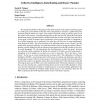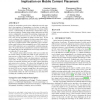14 search results - page 1 / 3 » Collective Intelligence, Data Routing and Braess' Paradox |
JAIR
2002
13 years 10 months ago
2002
We consider the problem of designing the the utility functions of the utility-maximizing agents in a multi-agent system (MAS) so that they work synergistically to maximize a globa...
AAAI
2000
14 years 6 days ago
2000
We consider the use of multi-agent systems to control network routing. Conventional approaches to this task are based on Ideal Shortest Path routing Algorithm (ISPA), under which ...
ICDM
2010
IEEE
13 years 8 months ago
2010
IEEE
Traveller information, route planning, and service updates have become essential components of public transport systems: they help people navigate built environments by providing a...
SIGMETRICS
2011
ACM
13 years 1 months ago
2011
ACM
Despite the tremendous growth in the cellular data network usage due to the popularity of smartphones, so far there is rather limited understanding of the network infrastructure o...
GIS
2008
ACM
14 years 12 months ago
2008
ACM
The application domain of intelligent transportation is plagued by a shortage of data sources that adequately assess traffic situations. Typically, to provide routing and navigati...


